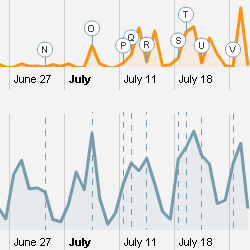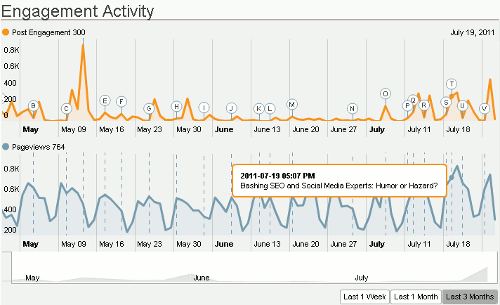
Google acquires many companies, but do you ever notice which ones, and do you ever speculate on why Google wants these start-up companies? I think it makes for some great water cooler gossip, but I also think it begins to form a picture of where our Internet is, and where it is moving.
Some of the recent Google acquisitions have been Fridge, which has a focus on security in social sharing, and PittPatt (Pittsburgh Pattern Recognition), a facial recognition developer. With only minimal creativity, one can imagine how these could each be useful to Google. I am confident that we will see influence from these technologies as Google continues to enhance the Google+ platform and other Google products.
In fact, if you have used Google+ at all, you can see some uncanny similarities between Google+ and Fridge.
Google and PostRank: An Obvious Match
I think perhaps one of the most telling of Google’s recent acquisitions is when they picked up PostRank in June. I wrote about PostRank back in 2010 in an article titled “Social Media Measurement Tools: What Do They Know About You?” Something I stated in that article was as follows: “PostRank pulls data from many sources, which makes it far less fallible than others which only measure single points of data.” It seems that Google noticed the value in this as well.
The image below shows an example of a PostRank score for a given article and indicates what PostRank knows about it. PostRank data can still be flawed, due to network restrictions and the sheer volume of data, but it does a good job.

We obviously know that Google has been very keen on social media for a long time. In fact, I have often said that Google is the ultimate king of social media. I do not mean because of their efforts with relative non-starters like Google Wave and Google Buzz, or the social feed in Google search results.
When I say that Google is the king of social media, I mean that because they have always made extraordinary strides toward measuring and delivering the information that is deemed important by social interaction. That social interaction has historically been in the form of websites linking to other websites. Google not only measures links from website to website, but they qualify it with the more popular websites providing amplification to the signal. This principle is not changing, but the methods and complexities of measurement are changing. In my estimation, Google is not missing a beat, and the acquisition of PostRank further adds to their reach.
People have tried to argue that Google’s measurement of links from one website to another is not social media, but let’s have a look at “social”. Social means, literally, “Of or relating to society or its organization” and it doesn’t just mean the microcosmic view of making buddies or socializing in the “let’s grab a beer” sense. By measuring website links, Google has used a social response from others to determine what people want, and what they are looking for.
So, let’s look at how the modern use of social media changed things. Google’s historical measurement of links is still just as social-based as what we see in modern social networks. The overall factors of separating the popular from the unpopular are similar. The difference today is that the simplicity of sharing those links is much easier for the non-technical “John and Mary Lunchbucket” type who don’t know anything about websites or HTML. Accordingly, it is much faster, and the amount of information to sort through is huge. There are a lot of factors to assimilate, and far more data points than ever before. Google is extremely efficient at this, but now Google has even more help gathering that data.
Since you may wonder how Google’s acquisition of PostRank really makes sense, or how it can help Google, here is a brief statement about PostRank in their own words:
The social web connects people where they share, critique and interact with content and each other. PostRank is the largest aggregator of social engagement data in the industry.
Our platform tracks where and how users engage, and what they pay attention to — in real-time. PostRank social engagement data measures actual user activity, the most accurate indicator of the relevance and influence of a site, story, or author.
PostRank provides useful data for publishers, and now that data will be useful to Google as well. I have heard a lot of people confused about how Google views the usage of modern social networks. I think it is absurd that a person could actually think they are not making efficient use of this information. For anybody who doubts the degree to which Google gives attention to modern social signals, the acquisition of PostRank should give a further indication that they are serious.

What Google Says About PostRank
According to an article on TechCrunch, Google made the statement about their acquisition of PostRank as follows:
As I said in my recent article about Klout, “I don’t think it is a good idea to become obsessed about statistics such as these, but I do believe it is valuable to be aware.”
If you are curious about how it works, or what PostRank knows about your presence on the web, I would encourage you to take a closer look and get familiar with PostRank.
This further emphasizes what I have always claimed, which is that SEO and social media marketing are entirely intertwined, and always will be. Through it all, I think it is important to note that Google wants to index your website, and they even go to great lengths to help you help yourself.
Please tell me what you think.
Podcast: Play in new window | Download